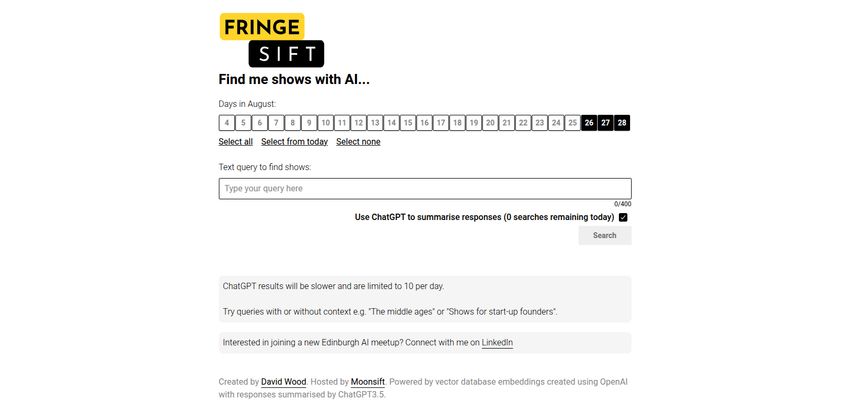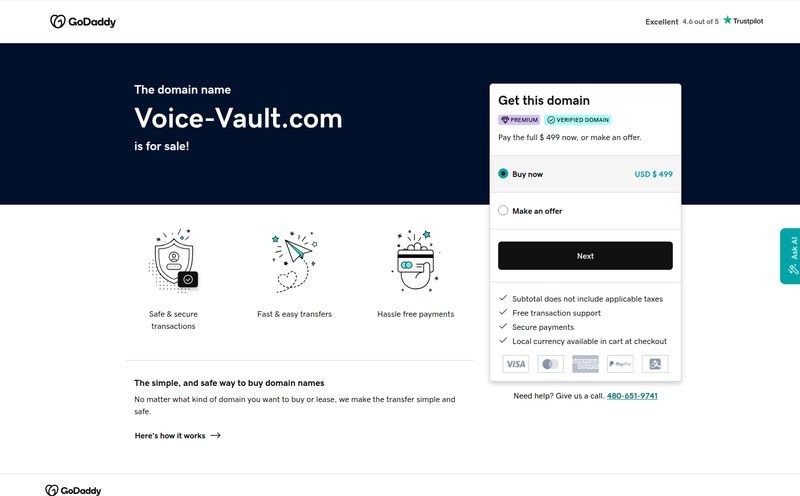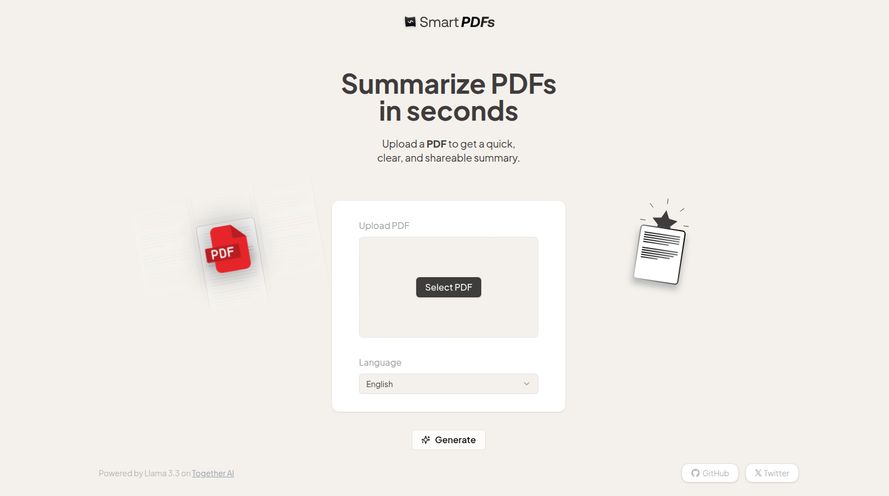Anyone who’s been to the Edinburgh Fringe Festival knows the feeling. It hits you the moment you pick up that gargantuan, phonebook-sized program. A wave of excitement, immediately followed by a cold sweat of pure, unadulterated overwhelm. It's a beast. A beautiful, chaotic, glorious beast.
For years, my strategy was a mix of hope, panic, and a rapidly disintegrating paper guide. I'd circle things, my friends would circle different things, and we'd end up seeing a comedy show in a broom closet that was... memorable, if not exactly what we were looking for. The official website is better, sure, but keyword searches can be so literal. You search for “magic” and you get 200 shows, from professional illusionists to a guy who’s just “magically” managed to get his show funded.
So, when I stumbled across a little project called FringeSift, my inner SEO and tech nerd sat up straight. An AI-powered tool to navigate the Fringe? Using vector databases and ChatGPT? Sign me up. This sounded less like a search engine and more like a digital truffle pig for finding performance gems.
So, What is FringeSift, Really?
At its heart, FringeSift is a search tool created by David Wood and hosted on Moonsift. But it’s not your average search bar. Instead of just matching keywords like a clumsy robot, it uses AI to understand the meaning and context behind your query. It was built for the 2023 Fringe, but the concept is timeless.
You don’t search for “comedy.” You search for “a funny show about the anxieties of being in your 30s” or “something weird and experimental that involves puppets but isn’t for kids.”

Visit FringeSift
The interface is wonderfully simple. You get a calendar to pick your dates in August, a big text box for your query, and one little checkbox: “Use ChatGPT to summarise responses.” This, my friends, is where things get interesting. It’s a simple, elegant solution to a massive discovery problem. No frills, no pop-ups, just a direct line to finding what you actually want to see.
The Magic Behind the Curtain: Vector Search and AI Summaries
Okay, let’s get a little geeky for a second, because how this works is genuinely cool. This isn't just marketing fluff; the tech here is what makes it special.
A Quick Word on Vector Search
For years in the SEO world, we've been moving from keywords to topics, from strings of text to user intent. Vector search is the technical manifestation of that shift. In the simplest terms, it converts all the show descriptions into a complex map of ideas (as numerical representations, or 'vectors'). When you type your query, it converts your words into a similar format and looks for the closest matches on that map.
Think of it like this: A traditional search is a librarian who can only find books with the word “dragon” in the title. A vector search is a librarian who, when you ask for “stories about giant, fire-breathing lizards and heroic knights,” understands the concept and can hand you books about dragons, wyverns, and maybe even a metaphorical tale about conquering your fears. It’s a game-changer for discovery.
The ChatGPT Summarizer: Your Personal Assistant
This is the other half of the equation. Once FringeSift finds potential shows, ticking that little box sends the results to ChatGPT 3.5 with a prompt to summarize them for you. Instead of getting a list of 10 show blurbs to read, you get a neat little paragraph saying something like: “Based on your query, I found a few intriguing options. There’s a stand-up set focusing on millennial problems, a two-person play about a strange friendship, and an interactive piece that seems quite abstract. The stand-up seems like the most direct match.”
It’s brilliant. But it comes with a catch. The tool notes that ChatGPT results are slower and are limited to 10 per day. This is almost certainly a cost-control measure (API calls ain’t free!), and it's a perfectly reasonable trade-off. It forces you to be thoughtful with your queries.
The Good, The Bad, and The... Quirky
After playing around with it, I've got some thoughts. No tool is perfect, but this one gets a lot right.
What I Genuinely Liked
The ability to search by vibe is just fantastic. I tried queries like “shows for a tech bro who secretly loves theatre” and “a wholesome story to take my mum to” and the results felt uncannily relevant. It cuts through the noise in a way that manual searching just can't. It’s free to use, which is incredible for a passion project like this. The clean, no-nonsense interface is also a huge plus. It knows you’re here to do one thing, and it helps you do it quickly.
A Few Caveats to Consider
Of course, there are limitations. The 10-per-day cap on ChatGPT summaries means you can’t just mess around endlessly. You have to save your 'smart' searches for when you really mean it. The tool also relies on the accuracy of the underlying data – the show descriptions from the official Fringe site. If a show's blurb is poorly written, the AI can't work miracles.
And let's be honest, ChatGPT can sometimes get a little... creative. It's an interpretation layer, not an infallible oracle. You still need to click through and read the actual description before buying a ticket. But as a shortlisting tool? It's phenomenal.
Who Is FringeSift Actually For?
So, who should use this? Honestly, almost everyone.
- The Fringe First-Timer: You're drowning. This is your life raft.
- The Seasoned Veteran: You think you know it all, but you're stuck in a rut of seeing the same big-name acts. Use this to find the hidden gems you'd normally miss.
- The Indecisive Group: Instead of arguing for hours, throw a weird, compromised query into FringeSift and see what it spits out. “A political comedy that’s not too preachy and is less than an hour long.” Go on, try it.
- The Tech Curious: If you want a real-world, practical example of how AI is changing search and discovery, this is it.
It’s a perfect example of a side project built to solve a real, nagging problem. It’s not trying to replace the magic of stumbling into a random show; it's trying to make the intentional part of your festival experience so much better.
The Bigger Picture: A Glimpse into Event Discovery's Future
While FringeSift was designed for a specific event in 2023, it feels more like a blueprint. Imagine this kind of semantic search for a music festival's lineup. Instead of filtering by genre, you could search for “chill afternoon vibes like Khruangbin” or “high-energy punk to jump around to.” Imagine it for finding a restaurant, a local market, or a conference session. This is how discovery should work. It should be conversational. It should understand us.
Frequently Asked Questions about FringeSift
Is FringeSift free to use?
Yes, the tool is completely free. However, the powerful ChatGPT summarization feature is limited to a certain number of uses per day to manage operational costs.
Do I need an account to use FringeSift?
Nope. You can just head to the website and start searching immediately. There are no logins or sign-ups required, making it incredibly accessible.
What kind of searches work best?
Natural language and conceptual queries are its superpower. Instead of 'drama', try 'a serious play about a family secret'. The more descriptive and vibe-oriented you are, the better the results will be.
Is this an official tool from the Edinburgh Fringe?
No, it is not. FringeSift is an independent project created by David Wood. It's a fantastic example of a developer building something to improve the community's experience.
Was this only for the 2023 Fringe?
The version I analyzed was for the 2023 festival. However, the underlying technology could easily be adapted for future festivals. We can only hope it makes a return!
What is a vector database in simple terms?
It's a type of database that stores information based on its meaning or context, not just keywords. This allows it to find conceptually similar items, even if they don't use the exact same words.
My Final Verdict
Look, the Edinburgh Fringe is meant to be a bit chaotic. That’s part of its charm. But there’s a difference between joyful chaos and stressful, inefficient searching. FringeSift is a brilliant, elegantly designed tool that leans into the former and eliminates the latter. It’s a testament to how modern AI can be applied in creative ways to solve very human problems.
It’s not going to replace the magic of a word-of-mouth recommendation whispered over a pint, but it sure as hell beats getting a paper cut from a 400-page guide. It's a fantastic project, and I for one am excited to see where this kind of technology goes next. Bravo, David Wood.
Reference and Sources
For those interested in the project and the minds behind it:
- The FringeSift tool was created by David Wood. You can connect with him on LinkedIn.
- The project was hosted by Moonsift.
- The technology uses vector embeddings created with OpenAI and summaries from ChatGPT 3.5.



